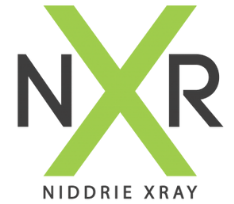An Ultrasound scan uses high frequency sound waves to create pictures of soft tissues (eg. muscles, glands) and organs inside the body (eg. kidneys). The non-audible sound passing into your body is safe because it doesn’t use radiation. That is why Ultrasound is often used for monitoring the growing child in pregnancy.
Ultrasound equipment uses a specialised handheld camera (Transducer) which the Sonographer places against your skin and moves around the area being imaged. The transducer emits sound and detects the returning echoes from the target area and this information is converted to a moving image displayed on a screen.
You are asked to lie down on a bed and the area to be examined is exposed while the rest of the body is covered.
The Sonographer puts a water based gel on the area of your body to be scanned to ensure the transducer makes good contact with the surface of the body. The transducer is then held against the area for imaging and moved around to give different views. This is generally not painful, although some pressure may need to be applied to improve visualisation, particularly in the abdomen and tenderness due to probe pressure can be a useful finding for your doctor . You may be required to breathe in deeply to allow your organs to be seen adequately or in order to keep your organs still for a short amount of time. Intermittently you may hear pulsing noises coming from the ultrasound machine if you are having your blood vessels tested but these are not loud.
The Sonographer watches the Ultrasound image on a monitor as they move the transducer around and still images can be recorded.
Usually ultrasound examinations are completed within 30 minutes. When the examination is complete, you may be asked to dress and wait while the ultrasound images are reviewed.
Yes, 1st trimester pregnancy ultrasound scans for dating performed between 6-12 weeks, 2nd trimester performed between 19-21 weeks and 3rd trimester growth scans are routinely done at our practice.
Yes, please call your us to make your appointment.
At Niddrie X-Ray we pride ourselves on our ability to deliver first class services within the health system using a Bulk billing methodology. This means that your ultrasound will be bulk billed if you have your Medicare card and a practitioner’s referral with you, and you will have no out-of-pocket expenses.
If you have a referral to another imaging practice or organisation we can still assist you as we put you the patient first and accept all referrals. If in doubt please seek advice from your referring medical professional.
If you have been referred for an Ultrasound Scan by your doctor, please contact the practice that is most convenient for you either by phone or in person to make a booking and confirm the preparation. Some ultrasound scans do not require any preparation whereas for other ultrasound scans, the preparation is of utmost importance in order to ensure that the most thorough scan can be performed.
For upper abdomen studies (such as liver, spleen, gallbladder, pancreas), do not eat, drink or smoke for 6 hours before your appointment. Continue to take any medication.
For lower abdomen studies (such as pelvis, pregnancy, kidney, prostate), you must have a full bladder at the time of the appointment. Empty your bladder 1½ hours before your appointment and then drink 1 litre of water, finishing 1 hour before your appointment time. Do not empty your bladder after this.
Generally, you will be most comfortable if you wear loose fitting clothing. You will need to remove clothing and jewellery in the area to be examined and you may be provided with a gown to wear.

